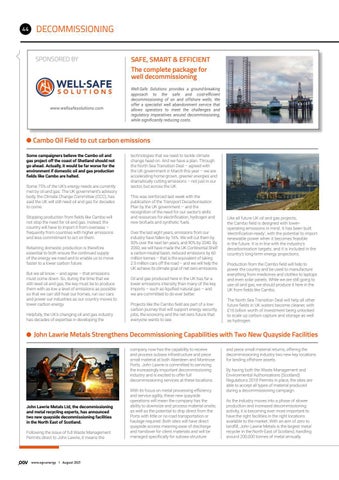44
DECOMMISSIONING SPONSORED BY
www.wellsafesolutions.com
SAFE, SMART & EFFICIENT The complete package for well decommissioning Well-Safe Solutions provides a ground-breaking approach to the safe and cost-efficient decommissioning of on and offshore wells. We offer a specialist well abandonment service that allows operators to meet the challenges and regulatory imperatives around decommissioning, while significantly reducing costs.
Cambo Oil Field to cut carbon emissions Some campaigners believe the Cambo oil and gas project off the coast of Shetland should not go ahead. Actually, it would be far worse for the environment if domestic oil and gas production fields like Cambo are halted. Some 75% of the UK’s energy needs are currently met by oil and gas. The UK government’s advisory body, the Climate Change Committee (CCC), has said the UK will still need oil and gas for decades to come. Stopping production from fields like Cambo will not stop the need for oil and gas. Instead, the country will have to import it from overseas – frequently from countries with higher emissions and less commitment to act on them. Retaining domestic production is therefore essential to both ensure the continued supply of the energy we need and to enable us to move faster to a lower carbon future. But we all know – and agree – that emissions must come down. So, during the time that we still need oil and gas, the key must be to produce them with as low a level of emissions as possible so that we can still heat our homes, run our cars and power our industries as our country moves to lower-carbon energy. Helpfully, the UK’s changing oil and gas industry has decades of expertise in developing the
technologies that we need to tackle climate change head-on. And we have a plan. Through the North Sea Transition Deal – agreed with the UK government in March this year – we are accelerating home-grown, greener energies and dramatically cutting emissions – not just in our sector, but across the UK. This was reinforced last week with the publication of the Transport Decarbonisation Plan by the UK government – and the recognition of the need for our sector’s skills and resources for electrification, hydrogen and new biofuels and synthetic fuels. Over the last eight years, emissions from our industry have fallen by 16%. We will cut them by 50% over the next ten years, and 90% by 2040. By 2050, we will have made the UK Continental Shelf a carbon-neutral basin, reduced emissions by 60 million tonnes – that is the equivalent of taking 2.5 million cars off the road – and we will help the UK achieve its climate goal of net-zero emissions. Oil and gas produced here in the UK has far a lower emissions intensity than many of the key imports – such as liquified natural gas – and we are committed to do ever better. Projects like the Cambo field are part of a lowcarbon journey that will support energy security, jobs, the economy and the net-zero future that everyone wants to see.
Like all future UK oil and gas projects, the Cambo field is designed with loweroperating emissions in mind. It has been built 'electrification-ready', with the potential to import renewable power when it becomes feasible in the future. It is in line with the industry’s decarbonisation targets, and it is included in the country’s long-term energy projections. Production from the Cambo field will help to power the country and be used to manufacture everything from medicines and clothes to laptops and even solar panels. While we are still going to use oil and gas, we should produce it here in the UK from fields like Cambo. The North Sea Transition Deal will help all other future fields in UK waters become cleaner, with £16 billion worth of investment being unlocked to scale up carbon capture and storage as well as hydrogen.
John Lawrie Metals Strengthens Decommissioning Capabilities with Two New Quayside Facilities company now has the capability to receive and process subsea infrastructure and piece small material at both Aberdeen and Montrose Ports. John Lawrie is committed to servicing the increasingly important decommissioning industry and is excited to offer full decommissioning services at these locations.
John Lawrie Metals Ltd, the decommissioning and metal recycling experts, has announced two new quayside decommissioning facilities in the North East of Scotland. Following the issue of full Waste Management Permits direct to John Lawrie, it means the
www.ogv.energy I August 2021
With its focus on metal processing efficiency and service agility, these new quayside operations will mean the company has the ability to downsize and process material onsite, as well as the potential to ship direct from the Ports with little or no road transportation or haulage required. Both sites will have direct quayside access meaning ease of discharge and handover for client materials and will be managed specifically for subsea structure
and piece small material returns, offering the decommissioning industry two new key locations for landing offshore assets. By having both the Waste Management and Environmental Authorisations (Scotland) Regulations 2018 Permits in place, the sites are able to accept all types of material produced during a decommissioning campaign. As the industry moves into a phase of slower production and increased decommissioning activity, it is becoming ever more important to have the right facilities in the right locations available to the market. With an aim of zero to landfill, John Lawrie Metals is the largest metal recycler in the North-East of Scotland, handling around 200,000 tonnes of metal annually.























